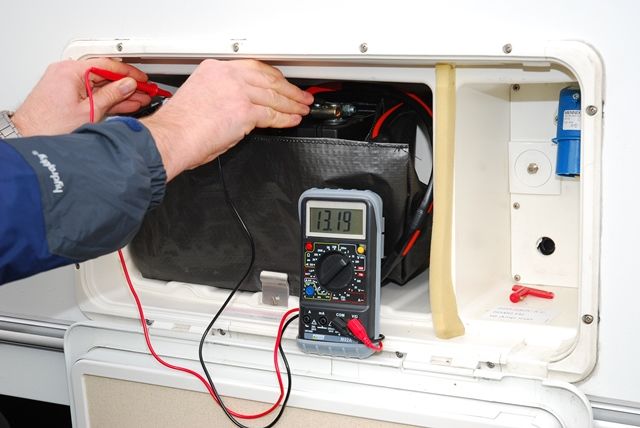Always carefully prepare your caravan or motorhome before the winter. First and foremost in winter months it is necessary to prevent the water supply system freezing in sub-zero temperatures. Water expands when it freezes and can do serious and expensive damage. So before storing your unit or leaving it unheated between trips, ensure it is fully and correctly drained down.
When leaving your unit for long periods leave the handbrake off to prevent the drums rusting and seizing to the linings. Consider removing the leisure battery and storing it at home, with regular recharging with a proper leisure battery charger (unless you have an alarm fitted). If left in the unit ensure the battery is isolated from all 12V equipment by means of the unit's isolation switch or disconnect it. Remember, even when not used a battery will discharge over time and once left in a discharged state its storage capacity can never be fully restored. A battery should not be left much more than six weeks before charging, less if the battery needs to remain connected to operate a security system.
It is wise to visit your caravan every so often in storage to check things over. Open all the windows to let the air circulate as well as check for mould growth, which will only get worse if left. Make sure for example that you have emptied out the fridge, let it achieve ambient temperature and dried it thoroughly before leaving it with the door slightly ajar.
If you have room at home, take the cushions with you to avoid them becoming damp and cold, and if you want to leave the bedding in the van over winter then consider packing it in vacuum bags that take up less space. See the Club's Data Sheet Winter care for your caravan for further information.
Starting out
Assuming you have had the caravan serviced during the winter period you will still need to make a few extra checks before starting the new season:
- Open all windows to air the van. Switch on the gas supply and make sure there is no smell of gas
- Turn on main 12V switch and check the battery voltage on the meter. A fully-charged battery will read 12.7V and if showing less than 12V it is best to charge it with a battery charger. For a caravan leisure battery, do not rely too much on the charging from the car when towing
- Close drain-down valves and taps and refill and sterilise the water system according to the instructions in handbook. Replace the water filter after sterilising the system
- Check for water leaks
- Make sure all 12V internal systems are working
- Connect to the car via the 12N or 13-pin plug and ensure all road lights are operating correctly
- Check road light lenses for water ingress, which can short out the lamp
- Test the smoke and CO alarms
- Check handbrake operation by applying and releasing
- Check and adjust the tyres to the correct pressure and check for cracks or other deterioration
- Use a torque wrench to check wheel nuts are tightened to the manufacturer's recommended settings
- Remove fridge vent covers if the temperature is above 10C
- Check all vents for leaves and debris
- Close windows.

Checking a leisure battery
In addition, before connecting to 230V electricity supply, examine the cable, plugs and sockets to make sure they are not damaged and check the RCD test button works before switching on any device. If you have been using your van regularly during the winter, most of this will have already been done, but it is always a good discipline to run a few checks every time you take it out again, after even a short period out of use.
And finally
You have spent many thousands of pounds on your home-from-home. Do not squander this investment by skimping on regular servicing and maintenance. It will repay you in the long term.
It is appreciated that many Club members are confident and experienced DIY-ers, but over the years equipment has changed and become more sophisticated and what you couldeasily do with a caravan or motorhome in past years is often more complicated and involved than it used to be. While the Club does not recommend DIY work on major or safety critical systems, this still leaves plenty of scope for routine maintenance and minor improvements to your van.
Whatever work you do yourself, a little caution now may prevent the embarrassment and cost of calling someone else to put it all right. Not to mention potential injury.
Further information
- Approved Workshops Scheme - www.approvedworkshops.co.uk or call 01252 318251 to find an Approved Workshop in your area. For further information on the scheme and to download caravan or motorhome service schedules go to the FAQ section on the website.
- The Caravan Manual and The Motorcaravan Manual are detailed maintenance guides with photographs. They are written by John Wickersham and published by Haynes.
If you have feedback on our new format Datasheet, please let us know, using our short Feedback Form.